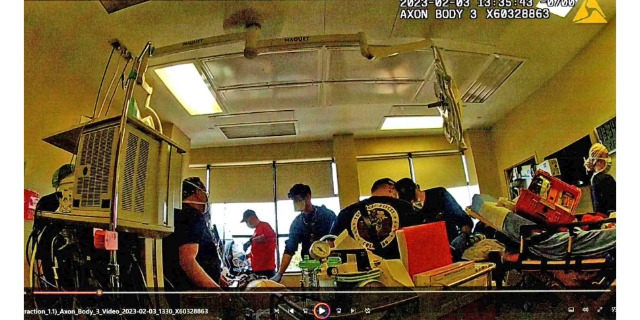Murdered caregiver’s family vows to fight for change
Published 3:00 pm Tuesday, September 26, 2023

- Friends and family of Haley Rogers spread her ashes Aug. 7 at Short Beach on the Oregon Coast. Rogers, 26, was killed in July at the Gresham group home where she was a caregiver.
Nearly three months after 26-year-old mental health aide Haley Rogers was murdered in a Gresham group home, family and friends of Rogers are demanding change to the caregiver industry at the state level.
Trending
Rogers was working an overnight shift July 16 when 59-year-old James Calvin Smith allegedly attacked her with a knife. A resident of the home reported to police that he heard screams, then saw Smith, who pleaded not guilty in Multnomah County Circuit Court the next day, standing over Rogers holding a knife.
Smith — deemed “dangerous and psychotic” as far back as the late 1980s — had a history of violent attacks, including an assault charge that involved use of a weapon in 2001. Smith had been remanded at least twice to the Oregon State Hospital, deemed “unable to aid and assist” in his own defense.
Rogers was working alone at the McCarthy Place group home in Gresham the night she was killed.
Trending
Rogers’ mother, Meshell Rogers, said it’s difficult to think about her first-born child’s final moments.
“The not knowing is something I have a hard time not thinking about, not wondering about,” she said.
“I don’t know how long she was there, still alive, realizing what had happened. And how long she was lying there dead, before she was found.”
McCarthy Place occupies a duplex, with men on one side and women on the other. Co-workers say Rogers dreaded working at the site. Aides must lock one side down — including medicine storage and sensitive areas — before tending to the other side.
Cascadia Health, which owns McCarthy Place, said a new policy was enacted the day after Rogers was killed that required two staff for overnight shifts.
Meshell Rogers, who previously worked for Cascadia, said her daughter didn’t talk much about work, though her computer search history included searches on de-escalating dangerous situations.
“I had been incredibly unhappy while I was there. I think she didn’t want to bring that on me. When I left, it was already pretty sketchy. Multiple people have come up to me and said things have happened to them … that they’ve felt afraid,” Meshell Rogers said.
Kenny Pittman, Rogers’ brother, said the loss of his older sister has devastated his family. Pittman was angry to learn about the March 27 death of Medford caregiver Barbara “Bobbie” Kolada.
Kolada was injured Feb. 20 while working alone at a group home run by Partnerships in Community Living in Medford. She died five weeks later in the ICU at Asante Rogue Regional Medical Center.
Kotek calls caregivers heroes
Kenny Pittman, Rogers’ brother, said he’s left with just memories and a necklace filled with his sister’s ashes. Pittman said his family has vowed to fight for changes to protect caregivers, including mandatory staffing ratios and added security measures.
Pittman said his family appreciated Gov. Tina Kotek attending Rogers’ memorial service July 30.
In a statement sent to the Rogue Valley Times Sept. 20, Kotek said, “Frontline behavioral health workers are everyday heroes. Frontline health care workers who serve individuals experiencing acute behavioral health challenges deserve the highest possible standard of workplace safety and support. Both of these incidents (Kolada and Rogers) are tragedies, and no one should lose their life on the job.”
Pittman said he and his mother have been in touch with Kolada’s family, as well as with friends of mental health worker Jennifer Warren, who was stabbed to death in May 2012 in St. Helens while delivering medication to a mentally ill resident.
Meshell Rogers, who worked for Cascadia Health home for seven years — in management for four — said it is not uncommon for patients from the state hospital to be placed at facilities ill-equipped to handle dangerous residents.
“I remember I had two individuals I interviewed for placement at my facility, and I knew we couldn’t care for them. I denied one of them three times, and my director came to me and said I had to take them,” she said.
“When they’re ruled ‘guilty except for insanity,’ they go to Oregon State Hospital until the hospital says that they are stable enough to go into a residential home.
“You can commit a horrible act, but if you say that God told you to kill somebody, then, ‘OK, we guess you’re crazy, so you don’t have to stay locked up or face any consequences?’” she said.
“It just feels like a failure on the part of the state. Like it’s this huge, terrifying loophole in the system.”
Co-workers devastated
Portland resident Cat Dynes, who worked with Rogers, said news of her killing felt like being “kicked in the stomach.” Dynes said McCarthy Place was known for having an unsafe layout, dangerous residents and staff who worked solo on overnight shifts.
“A lot of factors played into that event, but the most important one was they allowed this person to live in an unsecured facility, and they allowed them to go off their meds for two weeks,” Dynes said.
“I was told by an employee that … people have a right to go off their meds. Fine, but this person had a criminal history and had a history of stabbing women. … They’re dumping people with personality disorders into the mental health system, but they’re not giving us the proper tools to deal with it. If he was homicidal and psychotic, he should have never been allowed to live in an unsecured facility.”
Dynes, who resigned from Cascadia Sept. 25, acknowledged the company had instituted a new policy requiring two staff for overnights shifts — a result of union negotiations since Rogers’ death — but she said two staff aren’t always available.
“I’d worked a couple shifts alone since Haley died, so they’re not really being consistent about it yet,” she said.
Family vows to fight
Wearing his sister’s ashes around his neck, Pittman said it’s hard to accept the loss of his older sister. Family members scattered Rogers’ ashes Aug. 7 at Short Beach, south of Astoria.
“Haley called it Agate Beach, because she always found them there,” Pittman said. “It was her favorite spot to go to, and she always took (younger sister) Mekenzie and I along with her.”
Since her daughter’s death, Meshell Rogers said she’s worked through a range of emotions, from devastation to “complete outrage” for the girl she called “Haley Bob.”
“A lot of the time, I have to try to separate myself from it all mentally, just to be able to breathe. The first few days after it happened, I couldn’t get out of bed. I didn’t think I’d ever get out of bed again. But then I started getting mad and realized I had to get up. I felt like, ‘I can’t just lie here, because otherwise she died for nothing,” she said.
“When I’m alone sometimes I’ll see flashes of what I felt like her final moments must have been like. I just have this fire in my belly that makes me able to go out, to fight for her. If it goes out, I don’t know what will happen to me. … I want them to pay, publicly, for putting my daughter in this … situation.”
“I don’t know what the value of a human life is anymore — but it’s not what it used to be.”








